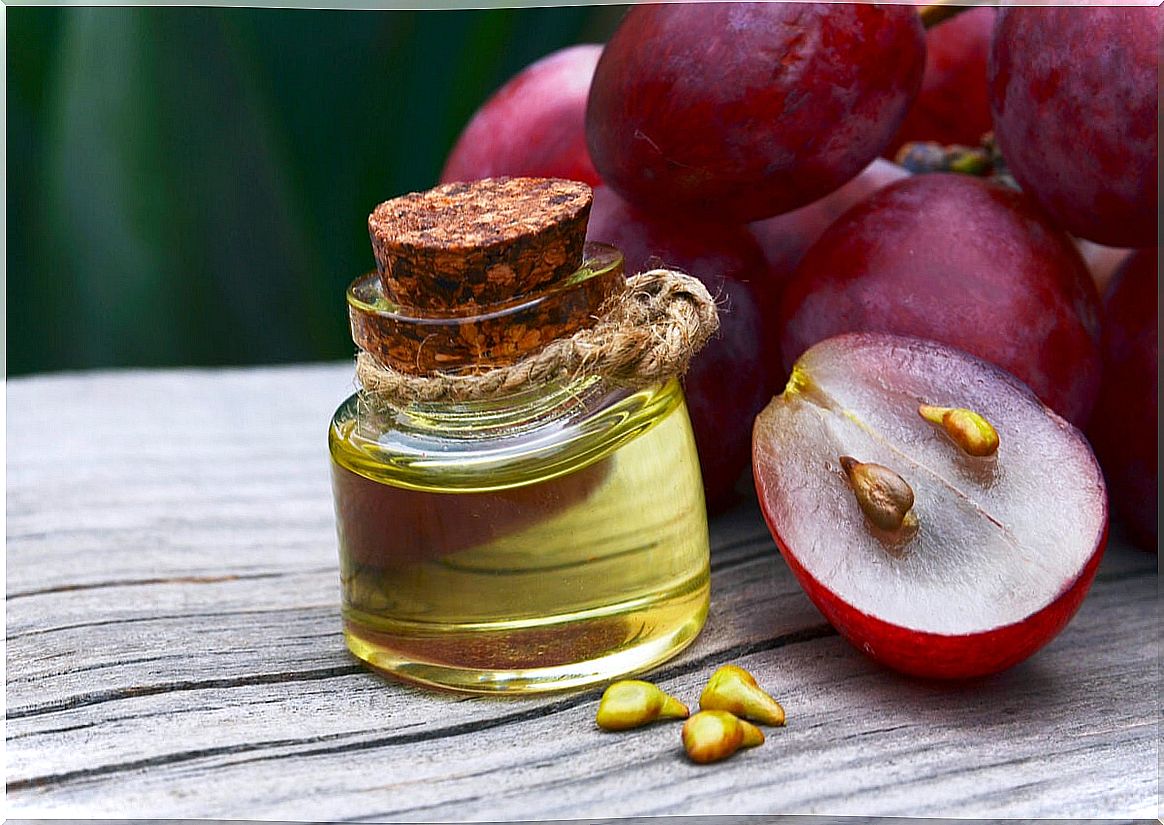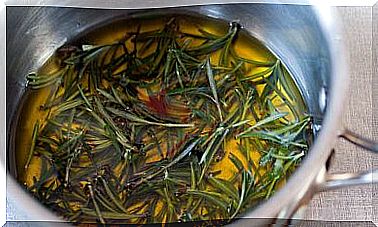Benefits And Uses Of Grape Seed Essential Oil
Grape seed oil is extracted from the crushing of the seeds found within the fruit of the vine. We show you its composition, what it is for and who should avoid it.

Thanks to its fruity aroma and flavor, grapeseed oil is widely used in the maceration of meats and the preparation of vinaigrettes. It is also prized in cosmetology for its high levels of linoleic acid, an omega 6 fatty acid that can improve skin health.
Extracted from the seeds found in the fruit of the vine, this oil owes its popularity to the high concentrations of chemical compounds it contains. Among them are polyunsaturated fats and vitamin E.
How is grapeseed essential oil processed? What is its composition? What uses does it have? Find out everything in detail.
How is the oil extracted?
Grape seed oil is obtained from the seeds of these fruits, considered a by-product of winemaking. For thousands of years winemakers did not know what to do with them. However, technology allowed them to develop a process in which oil is extracted from the seeds.
To do this, the seeds are crushed and solvents are used. However, there is concern about the use of these substances, since some, in this case hexane, are related to harmful effects on health.
However, solvents tend to disappear in the manufacturing process and there is no scientific evidence that hexane residues in oil cause short or long term damage. Of course, the environmental impact can be worrying.
In that sense, make sure that the grapeseed essential oil you buy indicates how it was processed. Otherwise, you must assume it was done with chemicals.

Composition of grape seed oil
According to research published in Nutrition and Metabolic Insights , grapeseed oil has phenolic compounds and unsaturated fatty acids that give it anti-inflammatory and antimicrobial properties.
In general, the fatty acids present in this oil are distributed as follows:
- 10% saturated.
- 16% monounsaturated.
- 70% polyunsaturated.
Most of these polyunsaturated fats consist of omega 6. According to studies, it is related to an increase in inflammation of the body compared to omega 3.
This is also reported in other research that links a high intake of omega 6 fatty acids with an increased risk of developing chronic diseases. However, there is scientific evidence that linoleic acid does not alter blood levels of inflammatory markers.
In this framework, it cannot be guaranteed that a diet high in omega 6 acids is the cause of pathologies. More research is still required to yield conclusive results.
Furthermore, oil is grape seed vitamin E source. A single 3.9-milligram tablespoon represents 19% of the recommended daily intake.
What other uses does it have?
Although grapeseed oil is known to improve skin health by fighting acne, treating oily skin, and rejuvenating skin tissues, these are not its only uses. It can also be used in cooking and aromatherapy, so let’s see more details below,
In the kitchen
Since it has a high smoke point, grapeseed oil can be used for frying and stir-frying. However, it is not recommended as it is a source of polyunsaturated fats.
According to a study published in Vascular Pharmacology, these types of fats tend to react unfavorably to oxygen at high temperatures, creating harmful compounds and free radicals.
Therefore, avoid using this oil for frying and, instead, use it as a salad dressing, add it in the preparation of mayonnaise and baked goods or in the mash of meats.
In aromatherapy
Chronic stress can trigger a number of major dermatological problems, including acne, hair loss, dry skin, rashes, and even premature aging.
Fortunately, aromatherapy is known to calm anxiety. Similarly, grapeseed oil is believed to be able to function as a carrier or base oil in this practice, as well as for sessions that include massages.
Possible risks of grapeseed oil
For those not allergic to this oil, the risks are few if applied to the skin. If you do not know if you have an allergy or not, a simple test is enough.
This consists of applying a little oil to a part of the body, such as the wrists or ankles, and waiting 24 hours. If after this time there is no reaction (spots or rash), this means that the skin can tolerate it.
Now, according to the National Center for Complementary and Comprehensive Health (NCCIH), grape seed oil may not be recommended for people who suffer from blood diseases, who will undergo surgery and who take anticoagulants such as warfarin.
Additionally, research published in the Journal of the American Oil Chemists’ Society found that some grapeseed oils can present harmful levels of polycyclic aromatic hydrocarbons (PAHs), a group of more than 100 chemicals known to be carcinogenic in animals. . For now, these effects have not been evidenced in humans.

Not everyone can use grapeseed oil
Grapeseed oil comes from the seeds found within the fruits of the vine. These are a by-product of winemaking, so to make the oil they are crushed and a solvent is used.
For their part, there are those who do not agree with this process as they consider it unhealthy, although there is no conclusive evidence that solvents can cause damage to the body.
As for its benefits, it is related to an improvement in skin health, from combating acne and treating dry skin to reducing dark circles and stimulating tissue rejuvenation. Its uses, beyond cosmetics, include the gastronomic field and aromatherapy.
Now, not everyone can use this oil. If you are allergic, suffer from a blood disease, will be operated on or take anticoagulant medications, you should avoid their consumption and topical use.









